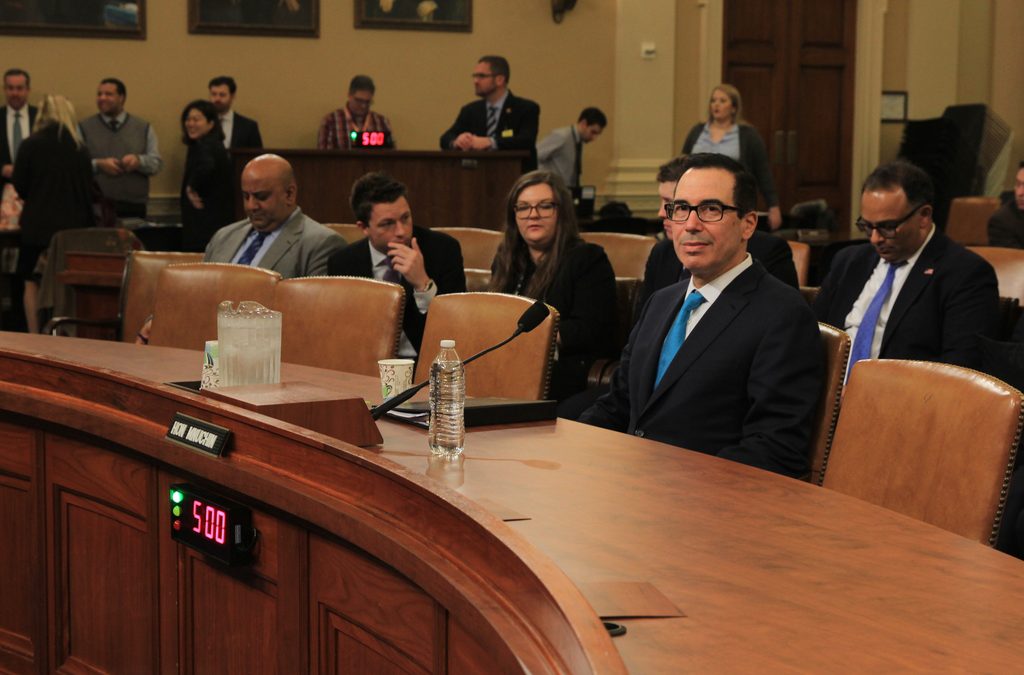Millions of middle-class Americans and businesses will enjoy substantial economic benefits in the coming years as a result of President Donald Trump’s tax and budget policies, Treasury Secretary Steven Mnuchin said at a hearing Thursday.
Mnuchin testified before the House Ways and Means Committee just days after President Trump unveiled his $4.4 trillion budget plan for FY 2019, which calls for severe cuts to domestic social safety-net programs, huge increases in military spending as well as funding for a border wall between the U.S. and Mexico.
“The policies in this budget will drive down spending and grow the economy, both of which are critical to putting the nation on a sound fiscal path over the long term and reducing the budget deficit as a share of GDP,” he said, referring to the Gross Domestic Product.
Congress and the White House recently struck a deal on a new spending package for the next two years that provides substantial increases in defense and domestic programs and is likely produce an annual deficit of more than $1 trillion by fiscal 2020,
It has long been a cliché in Washington that presidential budgets are “dead on arrival” because Congress is empowered by the Constitution to determine specific spending. In this case, Trump’s budget is doubly dead on arrival because it was superseded by the new two-year spending package.
Throughout his testimony, Mnuchin touted the benefits of the Republicans’ recently passed tax cut – the Tax Cuts and Jobs Act – claiming that 90 percent of Americans will see a reduction in their taxes and increases in take home pay beginning this month. Mnuchin said that Trump’s new budget for the coming fiscal year “reflects the recent tax reform legislation, which reduces the burden on taxpayers and sets the country up for long-term growth.”
While President Trump promised not to cut funding of popular domestic agenda programs like Medicare, Medicaid and Social Security during his campaign, his new budget slashes federal healthcare spending by $675 billion over 10 years, reduces college student aid spending by $200 billion in the coming decade and cuts funding for SNAP ‒ the federal food stamp program providing nutrition assistance to millions of people‒ by $214 billion.
Ranking committee member Richard Neal, D-Mass., argued during the hearing that middle-class families won’t see the budget gains Republicans are promising, calling Republican tax law “fiscally irresponsible.” Neal also expressed concerns about the budget’s proposed cuts to domestic health care programs like Medicare and Medicaid, adding that the programs will be jeopardized at the expense of hardworking Americans.
“The Trump budget is clear in cutting funds for Medicare and Social Security, but instead of cutting programs middle class families rely on, we should be fixing these problems in a bipartisan way,” he said. “Our goal on this committee is to work for these families and put them first instead of the wealthy.”
The White House’s assertions that slashing domestic program spending will somehow spur economic growth in the long-term are “simply not credible”, according to Gregg Gelzinis, a research assistant for economic policy at the Center for American Progress, a liberal organization.
“Cuts to programs like Medicaid, Social Security and SNAP take away health care and economic security from those who need it the most,” he said. “It is unacceptable to propose these cuts to help pay for tax cuts to millionaires. This is not only immoral, but also politically unpopular.”

